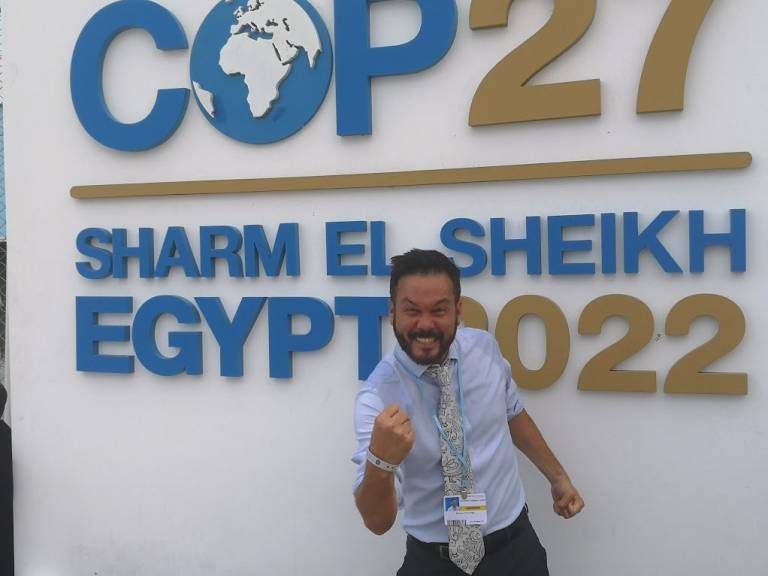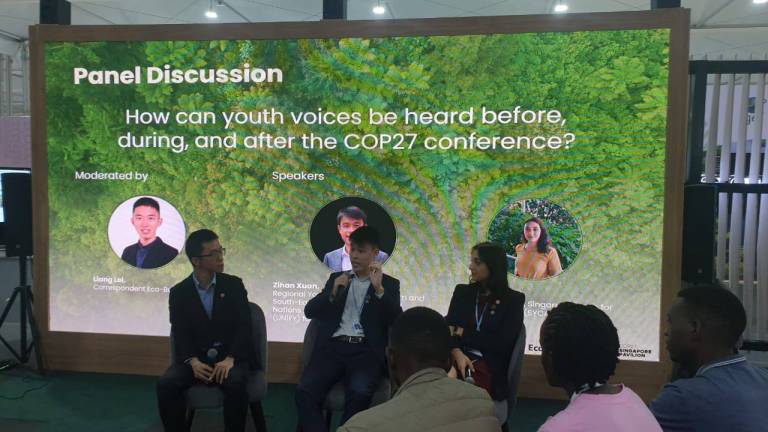With COP27 drawing to a close, we have spoken to some of our UCL colleagues attending the Climate Conference in Sharm El-Sheikh to hear more about their experiences of week 2.
Simon Chin-Yee has been following the UNFCCC processes for over a decade and participated in the last 8 COPs and intersessionals in various guises: as a researcher, a policy advisor, and civil society. He has over 15 years of experience in international cooperation and policy through multiple research roles within academia, as well as my work with the United Nations Education, Scientific and Cultural Organization (UNESCO). He joined UCL’s School of Public Policy in 2019. His research is focused on climate change, conflict and vulnerable populations – with an emphasis on human security and climate justice on the African Continent. Policy makers no longer speak of climate change solely in terms of environmental issues, but as a multiplying factor that has made its way into a broad spectrum of global political discourse, including narratives around conflict, peace and (in)security. His research examines the global climate negotiations, understanding how norms, values and rules constructed within the global climate regime have an influence on national policies. His current research project, which has its first workshop at COP27, looks at the decarbonisation of the maritime sector in eastern and southern Africa. Shipping represents a significant source of GHG emissions and is important for the economic development of low-income countries. This project aims to support countries as they consider how to achieve GHG emissions reductions, including the co-development of concrete and realistic plans both for national and international decarbonisation actions, political buy-in for implementation of these actions as well as capacity development within country.

What has been the highlight of week two?
On Friday, the day COP27 was supposed to end, a young 10-year-old Ghanaian girl, Nakeeyat Dramani Sam, addressed the plenary. She asked a simple question: ‘When can you pay us back? Because payment is overdue.’ She spoke what so many had been articulating for years, who is going to pay for the devastating damage brought on by Anthropogenic climate change?
Week two at COP27 ramped up in urgency as the closing plenary loomed. The fact that member states were negotiating the final text until 6am on Sunday morning is telling of how much work needed to be done. From a positive side, this meant that there was a real sense that they wanted to come up with something more substantial on Loss and Damage (L&D) - and they did. No small feat. However, by leaving it so late, the actual practicalities around how this new financial mechanism will actually work has been pushed until next year. It has also been highlighted by many that no new targets on emissions were set out, jeopardising the 1.5°C goal set out in the Paris Climate Change Agreement. For Civil Society, this was a particularly bizarre COP, as the normal activist activities that would take place outside the venue itself were not allowed. However, this L&D fund was a win for those who have been fighting for 30 years to get industrialised countries to agree to pay up for the historical emissions that have/are decimating economies, cultural identities and even whole societies - see the small island pacific states who were screaming loss and damage these past two weeks at COP.
What are the main findings you have gathered from COP?
My role at this year’s COP, was to conduct a lot of bilateral meetings with member states and the maritime industry. A UCL led project held a workshop during COP27. We see decarbonisation of shipping as a key opportunity that can combine climate change mitigation, adaptation policy and economic development. It can, for example, increase the case for investment in renewable energy and enable wider opportunities for sustainable economic growth. This was the first opportunity to explore in-person with stakeholders how a 5/6-year project could best fit their needs and circumstances. It offered a chance to introduce and get feedback on the project’s thinking to date, as well as have candid discussions on steps that could be taken in 2023 when the project is expected to formally launch. Having ministers and negotiators from our 5 partner countries as well as member of our consortium (World Bank, Global Maritime Forum, UN Foundation) in Sharm El Sheikh gave us the occasion to bring everyone together in one room.
While the high-level plenaries and working groups discussed the text and final outcomes of COP27, many others, including academia (UCL), international institutions (International Maritime Organisation), banks (African Development Bank), civil society (Pan African Climate Justice Alliance) and the Member States themselves were meeting to move many, many issues forward that would cut emissions in different sectors and contribute to the Nationally Determined Contributions (NDCs), intended to keep global warming to 1.5°C. These were also opportunities for countries to express their own priorities in the UNFCCC space, and how to create synergies with each other, as well as other institutions.
How will you incorporate your COP experience into your research/work moving forward?
I made a joke to one of the lead negotiators for Tonga, Sione Fulivai, that after week one, I could take may African hat off and put on my small island state hat. I see the global climate regime, and the negotiating spaces as informing both national climate and energy policy, while at the same time having the ability to create knowledge itself. A positive aspect of these climate negotiations is how values and norms can be shaped – while it may seem that those without hard power and most vulnerable to climate change (not to mention those not historically responsible, notably island states and African countries, have not had their voices heard – the constant push by these countries to stress issues of loss and damage and the need to act, and act now, has made its way into the norms that can inform and drive these UNFCCC processes. This has been the core of my research for almost a decade.
In addition, UCL is setting up its 2nd Maritime Sector workshop, to take place in Namibia in 2023 – the COP was a space in order to inform and celebrate the start of our project and to get the key players on boards as we move forward. We all have to watch our carbon footprint when travelling, in particular, to a climate conference, but we could not miss this opportunity when participants had flown in from all over the world to both learn from them, inform our research and our project, and looking for concrete pathways froward.
Coverage from our students attending COP27 Independently
Xuan Zi Han is a climate advocate with YOUNGO, the youth constituency of the United Nations Framework Convention on Climate Change (UNFCCC), and a second-year student of Philosophy, Politics, and Economics (PPE) at the UCL Department of Political Science. Zi Han was the Co-Lead of the COP26 Global Youth Statement, a climate policy document drafted in consultation with more than 40,000 young people from more than 135 countries around the world. In addition, he is a member of the UNEP Youth Task Force of the UN Decade on Ecosystem Restoration (2021-2030). Zi Han attended COP27 as the Children and Youth Pavilion Speakers lead.

“COP27 is a two-week conference but the real work begins at home, in grassroots communities, and throughout the year!” Xuan Zi Han, UCL
What has been the highlight of week two?
I had the privilege of moderating the Youth Day special event at the Children & Youth Pavilion, which gathered world leaders, youth advocates, and indigenous communities to demonstrate the power of intergenerational climate action and solidarity. During the event, I met the Global Alliance of Territorial Communities, and was inspired by their work to protect indigenous land around the world.
What are the main findings you have gathered from COP?
Having followed the Global Stocktake process, I believe it is absolutely crucial for us to take stock of our collective progress towards and implementation of the Paris Agreement, in order to chart the path forward.
How will you incorporate your COP experience into your research/work moving forward?
I hope to leverage on my COP experience for my undergraduate dissertation, which will focus on climate justice and political philosophy.
 Close
Close

